Economic Arguments Against the Re-nomination of Bernanke as Fed Chairman
Economics / Central Banks Jul 30, 2009 - 07:35 PM GMTBy: Paul_L_Kasriel
 I Come Neither to Praise Nor to Bury Bernanke - No one is indispensable. There are plenty of well-qualified candidates to replace Ben Bernanke as chairman of the Federal Reserve Board of Governors. So, the Republic will survive whether or not Ben Bernanke is re-nominated as Fed chairman. But let us be objective in assessing the job he has done as chairman. In my opinion, Anna Schwartz was not objective in her July 26 NYT op-ed piece arguing for the dumping of Bernanke.
I Come Neither to Praise Nor to Bury Bernanke - No one is indispensable. There are plenty of well-qualified candidates to replace Ben Bernanke as chairman of the Federal Reserve Board of Governors. So, the Republic will survive whether or not Ben Bernanke is re-nominated as Fed chairman. But let us be objective in assessing the job he has done as chairman. In my opinion, Anna Schwartz was not objective in her July 26 NYT op-ed piece arguing for the dumping of Bernanke.
 Ms. Schwartz asserts that Bernanke should not be re-nominated because of his sins of commission as well as his sins of omission. It is not clear to me to what Bernanke sin of commission Ms. Schwartz is referring. She alludes to the flooding of the financial system with Fed credit, which drove down the overnight cost of funds in the interbank market to almost zero. But was that a policy sin? Did not Ms. Schwartz co-author with Milton Friedman, a Nobel economics prize winner, a tome (A Monetary History of the United States, 1867 to 1960) of which one of the key conclusions was that the Federal Reserve was too timid in creating credit in the early 1930s? Friedman and Schwartz are associated with the monetarist school of economics. But there was a Nobel Prize winner associated with the Austrian school of economics, Friedrich Hayek, who also advocated a step up in central bank credit creation in situations arguably similar to those experienced in the U.S. in the past year. Hayek identified an economic environment he termed a "secondary depression" or "secondary deflation."
Ms. Schwartz asserts that Bernanke should not be re-nominated because of his sins of commission as well as his sins of omission. It is not clear to me to what Bernanke sin of commission Ms. Schwartz is referring. She alludes to the flooding of the financial system with Fed credit, which drove down the overnight cost of funds in the interbank market to almost zero. But was that a policy sin? Did not Ms. Schwartz co-author with Milton Friedman, a Nobel economics prize winner, a tome (A Monetary History of the United States, 1867 to 1960) of which one of the key conclusions was that the Federal Reserve was too timid in creating credit in the early 1930s? Friedman and Schwartz are associated with the monetarist school of economics. But there was a Nobel Prize winner associated with the Austrian school of economics, Friedrich Hayek, who also advocated a step up in central bank credit creation in situations arguably similar to those experienced in the U.S. in the past year. Hayek identified an economic environment he termed a "secondary depression" or "secondary deflation."
According to G.R. Steele, an Hayekian scholar, "where bank failures and the resulting monetary contraction are effects (not causes) of an economic downturn, these can trigger a 'secondary depression' as goods are unsold, workers are dismissed and prices and wages tend to fall. So, there is a (practically difficult) distinction to be drawn between the structural unemployment that arises in sectors whose unwarranted expansion is the consequence of monetary profligacy, and the general unemployment that is caused by secondary deflation once the inevitable recession is set in train." (G. R. Steele, "Hayek's Theory of Money and Cycles: Retrospective and Reappraisal," The Quarterly Journal of Austrian Economics, Spring 2005, p.8). Steele goes on to interpret and quote Hayek on this issue (F.A. Hayek, "A Discussion with Friedrich von Hayek," American Enterprise Institute for Public Policy Research, 1975, p.5): "More generally, intervention by the monetary authorities could bring advantages 'in the later stages of a depression' when 'deliberate attempts to maintain the money stream' would be justified to counter the 'cumulative process of secondary deflation.'" As an aside, Hayek even sanctioned "fiscal stimulus" in an environment of a secondary recession.
Again Steele interprets and quotes Hayek (F.A. Hayek, New Studies in Philosophy, Politics, Economics and the History of Ideas, published by Routledge and Kegan Paul, p.212): "[B]ut that one measure to offset secondary depression would be to provide 'employment through public works at relatively low wages so that workers will wish to move as soon as they can to other and better paid occupations.'"
After Lehman failed in mid-September 2008, the interbank lending market shut down. That is, Bank A would not lend on an unsecured basis to Bank B because Bank A did not know whether Bank B would fail the next day. The Federal Reserve was established by an act of Congress in 1913 with the primary mission of providing credit to solvent banks that were having temporary funding difficulties. Whether they were solvent or not is a legitimate question, but there was no question that banks were having funding difficulties immediately after Lehman's failure. So, the Fed provided funding to banks and other financial institutions via the Fed discount window and via new Fed credit facilities such as the Term Auction Facility (TAF). And bank reserves have mushroomed. But so have excess reserves on the books of banks.
As shown in Chart 1, bank reserves have risen from $43.9 billion in June 2007 to $809.8 billion in June 2009. At the same time, banks' excess reserves as a percent of their total reserves have gone from 4.0% in June 2007 to 92.8% in June 2009 (see Chart 1). So, the bulk of reserve credit created by the Federal Reserve in the past two years has ended up as excess, i.e., idle, reserves sitting on the books of banks. Rather than the explosion in reserves at depository institutions leading to an explosion of lending on the part of depository institutions, just the opposite has occurred - an implosion of net lending by depository institutions has occurred (see Chart 2).
Chart 1
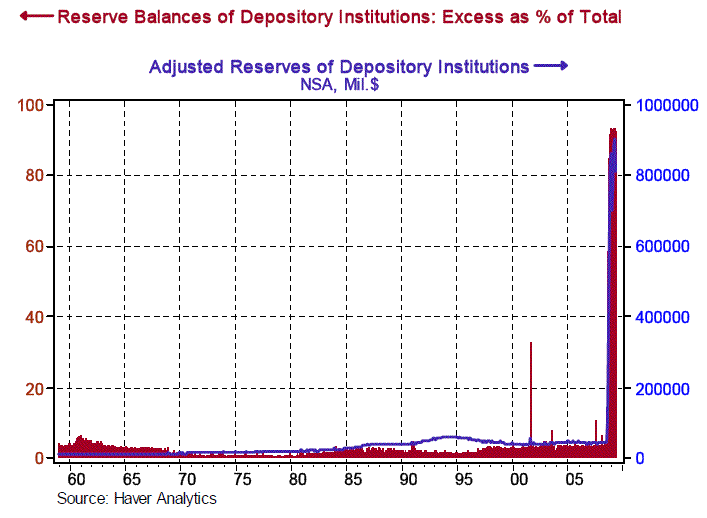
Chart 2
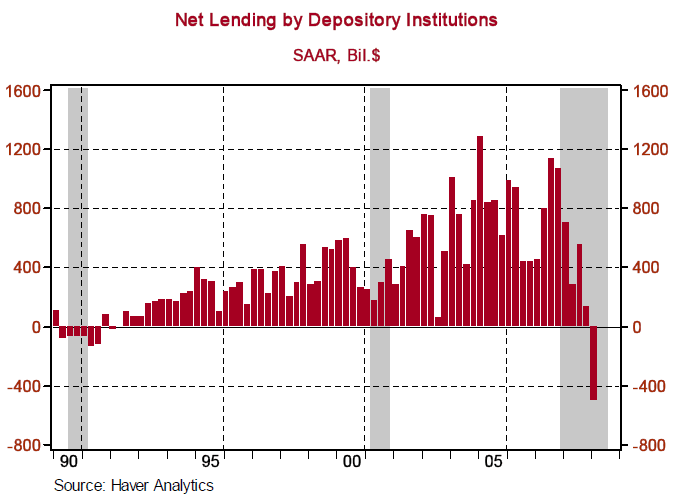
In the third and fourth quarters of last year, when Lehman failed and the fallout from its failure spread through the financial system, investors' demand for financial assets free of default risk soared. In addition to U.S. Treasury securities, currency and government-guaranteed bank deposits saw their demand increase (see Chart 3). The demand for money to hold increased. But at the same time that the demand for money to hold was increasing, the rate of growth in deposits issued by commercial and saving banks was slowing (see Chart 4). If growth in the demand to hold money is rising and growth in the supply of money is slowing, then households will attempt to increase their money holdings by cutting back on their current spending. This leads to slower growth in total nominal spending, a proxy for which is nominal GDP. As shown in Chart 4, as growth in deposits slowed, growth in nominal GDP slowed even more. Another way of stating this is that an increase in the public's demand to hold money is tantamount to a decrease in the velocity of money. If the supply of deposits had increased commensurate with the decreased velocity of deposits, then there would have been no effect on nominal GDP. But growth in deposits did not keep pace with the deceleration in the velocity growth. As a result, growth in nominal GDP slowed.
Chart 3
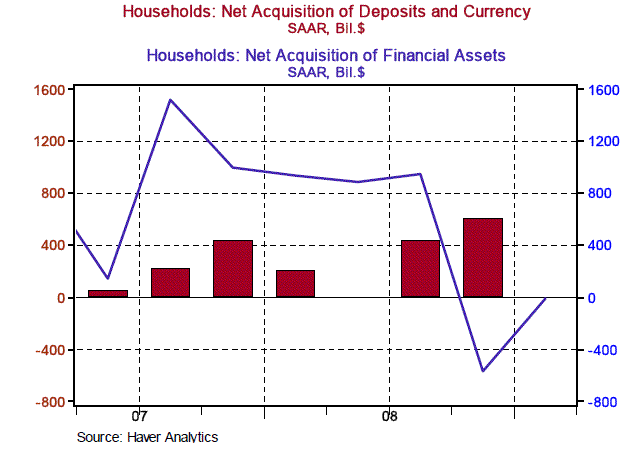
Chart 4
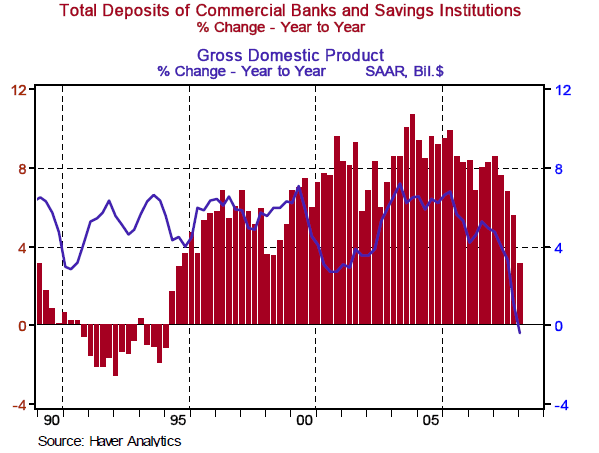
Why have banks chosen to sit on idle excess reserves rather than using them to create more credit? Banks need adequate capital to support new lending. Losses from residential mortgages have eroded bank capital in the past year. Although banks have stepped up their capital-raising activity by issuing more equities (see Chart 5) and have received capital injections from the Treasury, they may fear that the new capital that has been acquired will be eroded in the not-too-distant future by losses related to commercial real estate mortgages as well as consumer debt (credit cards and auto loans).
Chart 5
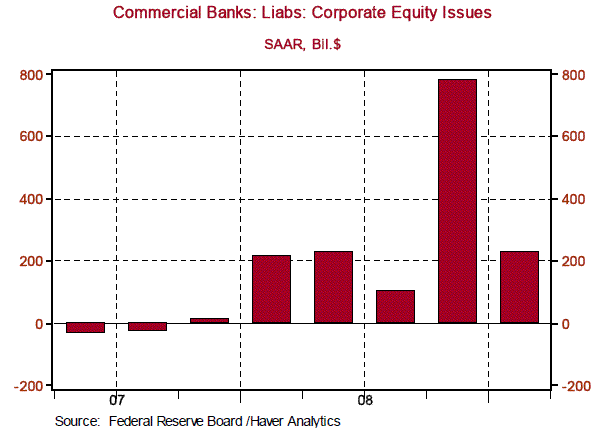
At some point, however, banks will be recapitalized to the point that they will want to begin "activating" their excess reserves. Draining or neutralizing these massive excess reserves before banks create inflationary credit will be the test of the next Fed chairman. Ms. Schwartz assumes that Ben Bernanke will not be up to the test. She is entitled to her assumption. But that is all it is - an assumption. To state that Bernanke should not be re-nominated as Fed chairman because you assume he will not act to drain liquidity at the appropriate time seems to me to be a weak argument.
Now on to what Ms. Schwartz considers to be Bernanke's sins of omission. Ms. Schwartz believes that Bernanke misread the need for capital on the part of financial institutions as a need for liquidity. I would argue that financial institutions needed capital and liquidity, but the Fed could only supply liquidity. And, by quickly supplying massive amounts of liquidity, the Fed may have lessened the amount of capital financial institutions ultimately would have needed. As mentioned earlier in this commentary, the market for interbank lending froze up after Lehman's failure. Had the Fed not stepped up its funding facilities for financial institutions, these institutions en masse would have been forced to liquidate assets, which would have driven down the prices of these assets as well as those remaining on their balance sheets. This would have exacerbated the erosion of capital financial institutions already were experiencing. In other words, otherwise solvent institutions can become insolvent if they simultaneously have funding problems.
Another of Bernanke's sins of omission according to Ms. Schwartz is that the Fed did not warn investors that many of the exotic financial instruments created in the past credit boom were difficult to price. According to Ms. Schwartz: "The Fed is the manager of markets. There is thus every reason to expect that it would see the problems that these new instruments were likely to create for normal transactions, and speak up about them." The Fed is the manager of markets? Milton Friedman must be spinning in his grave! I thought that both monetarists and Austrians believed that the Fed should follow the doctrine, "first do no harm." Since when should the Fed try to manage markets? Actually, Bernanke's predecessor, Alan Greenspan, did speak up about these new instruments. He praised them! So, Ms. Schwartz must be pleased with President Bush's decision not to sponsor any legal shenanigans that would have allowed Greenspan to stay on as Fed chairman.
There is one sin of omission mentioned by Ms. Schwartz with which I concur. The Fed did not articulate the principles that would guide it to aid in the rescue of Bear Stearns but not that of Lehman. This lack of clarity did contribute to added and unnecessary volatility in the financial markets.
Now, I would like to offer up my own argument against the re-nomination of Bernanke as Fed chairman. In my opinion, the seeds of our current economic and financial market problems, if not sown, were fertilized in the early years of this decade, which included Bernanke's tenure as a Fed governor (2002 - 2005). Never once during his tenure as a Fed governor did Bernanke officially dissent from a majority decision of the Greenspan-led FOMC. Again, in my opinion, this is Bernanke's disqualifying sin of omission.
Paul Kasriel is the recipient of the 2006 Lawrence R. Klein Award for Blue Chip Forecasting Accuracy
By Paul L. Kasriel
The Northern Trust Company
Economic Research Department - Daily Global Commentary
Copyright © 2009 Paul Kasriel
Paul joined the economic research unit of The Northern Trust Company in 1986 as Vice President and Economist, being named Senior Vice President and Director of Economic Research in 2000. His economic and interest rate forecasts are used both internally and by clients. The accuracy of the Economic Research Department's forecasts has consistently been highly-ranked in the Blue Chip survey of about 50 forecasters over the years. To that point, Paul received the prestigious 2006 Lawrence R. Klein Award for having the most accurate economic forecast among the Blue Chip survey participants for the years 2002 through 2005.
The opinions expressed herein are those of the author and do not necessarily represent the views of The Northern Trust Company. The Northern Trust Company does not warrant the accuracy or completeness of information contained herein, such information is subject to change and is not intended to influence your investment decisions.
Paul L. Kasriel Archive |
© 2005-2022 http://www.MarketOracle.co.uk - The Market Oracle is a FREE Daily Financial Markets Analysis & Forecasting online publication.



